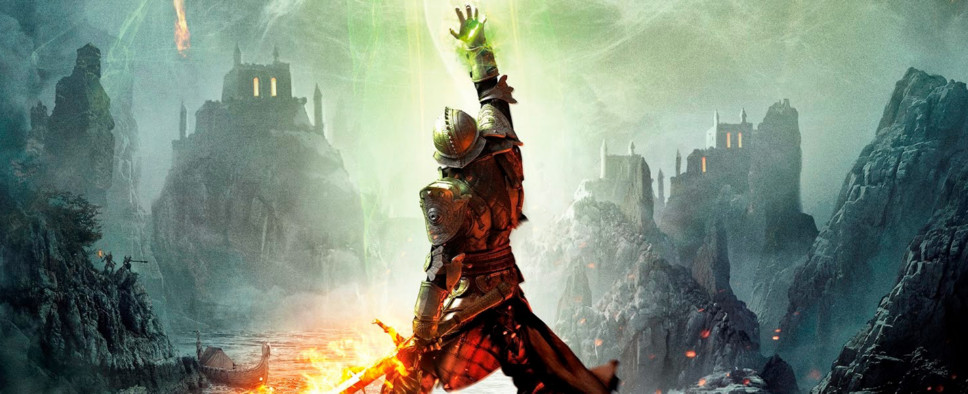Dragon Age: Inquisition + Jaws of Hakkon DLC Review
-
Category: ReviewsHits: 21147

Article Index
Introduction
A follow-up to Dragon Age II. The real sequel to Dragon Age: Origins. The perfect pick-up point for new fans. The culmination of the plotlines seeded in the previous two games and their DLCs. I don't envy BioWare. Dragon Age: Inquisition was always saddled with enormous expectations. Fans expected Inquisition to keep everything they enjoyed in previous games and make it better. Meanwhile, many detractors hoped (some in the open, some in secret) that this would be the installment for them.
Credit where credit is due: BioWare clearly took all the expectations and criticism into account when designing the game. Gone are the copy-pasted caves and the waves of parachuting bandits from Dragon Age II. All the playable races from Dragon Age: Origins plus a new one, the Qunari, are in. There are even a few concessions that concern the combat system, the most notable of them being a new tactical camera that aims to provide more control over the full party, inspired by Dragon Age: Origins.
Of course, the story too aims to recapture what fans loved about the original title. It's an epic fantasy romp with high stakes, a cackling central villain, a clearer structure, and a grand sense of scope. And yet Dragon Age: Inquisition doesn't work. It's an enormous game, crafted with care to capture new and old fans alike, that is less than the sum of its parts and not terribly memorable. Why? Because it doesn't feel like a BioWare game.
The Story
By now, everyone familiar with the Dragon Age franchise is familiar with the conflict between Mages and Templars. In short, Mages are forced to live in "Circles" and guarded by Templars, who keep them on a tight leash because of their innate potential to cause harm. It's a simple security-versus-freedom dilemma that grew in scale so much that it turned into a full-scale war by the end of the second game.
A magical explosion of unprecedented scale interrupts a peace summit to stop this very war, and it's from that point that Dragon: Age Inquisition picks up. A tear in the sky, a great rift in the Veil that divides the world of Thedas with the Fade, the realm of demons and dreams, is open. The only person capable of closing it is the player character. This ability is the reason the player character is enlisted in the Inquisition, a resurrected independent institution from Thedas' past, with the intention to find the person responsible.
Here, already, Dragon Age: Inquisition shows promise and an uncanny ability to squander it. The game's fiction assumes, during its first act, that the protagonist isn't yet in charge of the Inquisition, but none of the gameplay systems seem to take that into account. Since the beginning of the game you are the de facto leader, even during the short sections where the character is a prisoner of Cassandra Pentaghast, one of the game's companions.
If that can be excused as a gameplay concession, the same can't be said of the way the game squanders another of its interesting aspects: the relationship between the Inquisitor and her title of "Herald of Andraste". Because of the circumstances of the Inquisitor's survival and her newfound powers, many characters assume that she received divine help. Deciding how to relate with that notion made for a very interesting experience that reminded me of Arcanum.
The mystery and ambiguity are cast away about halfway through the game, however, when a neat reveal explains exactly what happened. The game's back half is full of similar reveals that seem to build up to future Dragon Age installments, and that's yet another problematic aspect of Inquisition's plotting. The events of the story feel positively unimportant when measured against the future events that are foreshadowed. The game sells itself as an epic high fantasy story, and yet ends up feeling like barely a prologue.
The final nail in the coffin is the game's central villain. Built up as an unstoppable force during the first act of the game, it's actually one of the most comically ineffectual villains I've ever encountered in an RPG. I concede that this isn't, per se, a bad thing, but there's no grand point BioWare builds to with this choice, no interesting reversal. The lack of a credible threat also robs the plot of a sense of progression, the feeling of triumph over adversity. The game's epilogue was a lovely moment, but ultimately felt unearned.
Dragon Age: Inquisition's writing left a bitter taste in my mouth. Still, I'd be dishonest if I didn't mention what worked. BioWare has always been very good at creating charming banter and dialogue, and confirmed this quality in Dragon Age: Inquisition. The company's approach to dialogue isn't for everyone - the BioWare writers are certainly self aware, but that never tempers their love for melodrama and tin ear for inspiring moments - but for someone open to their approach, there's a lot to enjoy in Inquisition.
The quiet character moments wouldn't work if there wasn't a decent cast of supporting characters to deliver them, so it's a good thing that the cast of companions and supporting characters in Inquisition is very strong. All the companions have memorable personalities and expand on the story in some way. They either tie into the themes (questions pertaining personal identity and public personas are especially prominent throughout the game), or offer a personal voice or twist on the setting's factions and societies.

